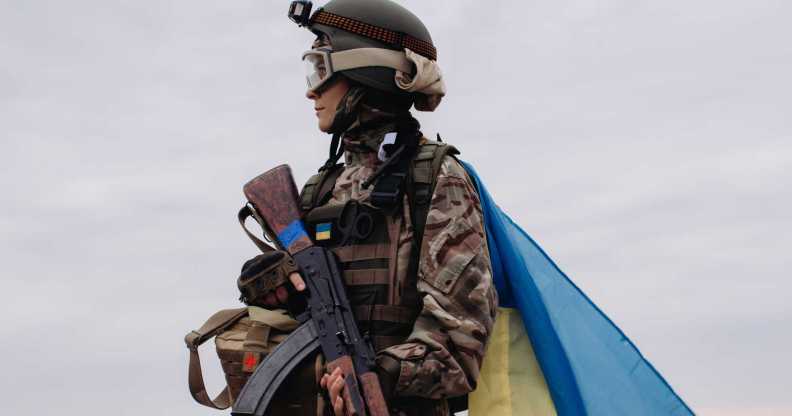Queer Ukrainian soldier calls for same-sex marriage to be legalised: ‘We can die any day’

Anna ‘Kajhan’ Zyablikova has called for same-sex marriage to be legalised in Ukraine. (Getty Images)
A queer Ukrainian solider has called for same-sex marriage to be legalised in the country as LGBTQ+ soldiers “could die tomorrow” and their partners would have no legal rights in an “unfair” system.
Anna “Kajhan” Zyablikova, who is serving in the 47th Brigade of Ukraine’s armed forces, said same-sex marriage should be legalised to allow LGBTQ+ couples the same legal rights heterosexual couples are afforded.
This would include the right to make the decision of whether to keep their partner on life support.
The 30-year-old told the i paper: “We have no legal rights to do that and in the case of war, the inability to do this is a huge psychological issue.”
Following the invasion of Ukraine on 24 February 2022, many Ukrainians married to ensure their partners would be protected in a time of huge uncertainty.
In November last year, Kyiv resident Leda Kosmachevskaya said she planned to marry her gay soldier friend so someone can “claim him if he dies” while fighting in the war.
‘Taking this opportunity from us is unfair’
Zyablikova added: “I feel like something is taken from me every time I see one of our soldiers is getting married, as I think of the fact that I can’t do it if I want to do it with a woman.”
“We can die any day, so everyone is trying to make all the decisions that are about relationships and communication.”
“People want to be able to support one another because we are so vulnerable now and we just want to have this back up plan and we’d be happy to do it for the people we love and care about.”
A petition was launched in 2022 which called for marriage equality to be introduced in Ukraine.
In August, President Volodymyr Zelensky responded to the petition, which was signed by thousands of people, and said he would work with the government to ensure “all people are free and equal in their dignity and rights” – but not until after the war with Russia ends.
Zyablikova, whose ex-girlfriend left her when Russia invaded Ukraine, said marriage is “a way of making your connection stronger”.
“Any person in Ukraine could die any night because those rockets are coming. When you feel like you’re not doing enough for the person you love, it’s suboptimal,” she said.
Joining the armed forces as an LGBTQ+ person has been harrowing for Zyablikova, who said Vladimir Putin had tried to portray queer people as “non-soldiers” fighting against “pure” Russian troops on the territory of Ukraine.
“That’s their main fairy tale, which is unfortunately working, it is really exploiting the homophobic narrative.”
The conflict has increased LGBTQ+ acceptance in Ukraine
Homosexuality has been legal in Ukraine since 1991 – the year the nation declared independence from the Soviet Union – but same-sex marriage and civil partnerships are currently not recognised.
Despite homosexuality being legal, the LGBTQ+ community in Ukraine has faced continued social and political prejudice.
However, research from numerous groups suggests that support is rapidly growing for equal rights in Ukraine.
Data from the Institute of Sociology of the National Academy of Sciences of Ukraine suggests that support for same-sex partners has almost doubled since 2013.
Earlier this month, Ukrainian MP Inna Sovsun put forward a bill calling for same-sex partnerships to be legally recognised in the war-torn country.
Sharing the news that she had submitted the draft bill in a thread of tweets on 7 March, the MP cited the figure that “56 per cent of Ukrainians” support same-sex partnerships.
The proposed legislation was announced just two days after two KyivPride staffers told PA news agency that the conflict had unexpectedly resulted in more acceptance of LGBTQ+ people in Ukraine.

